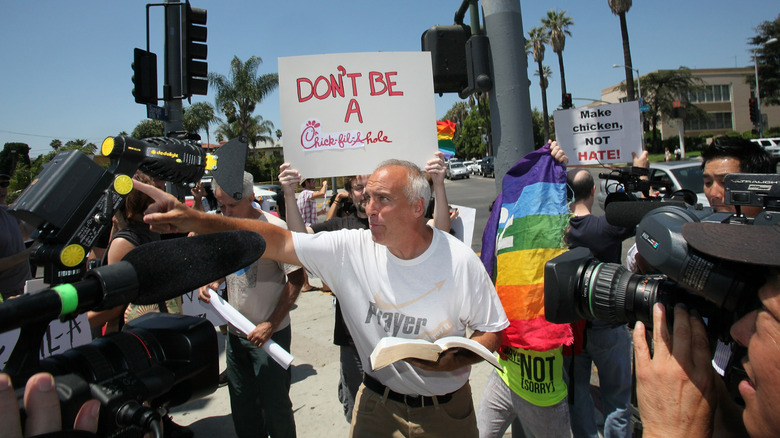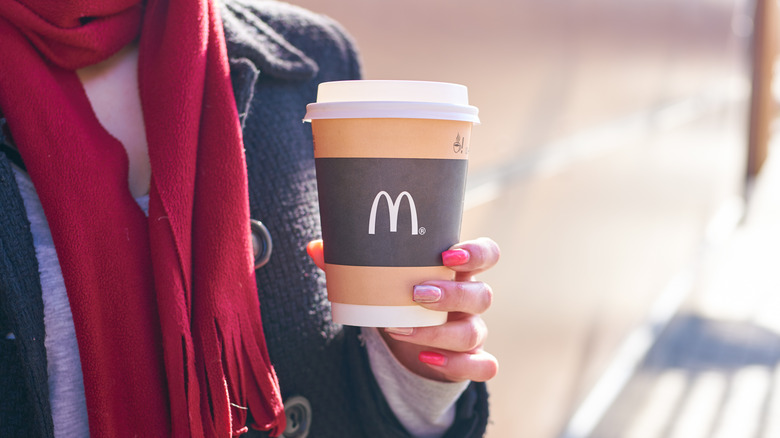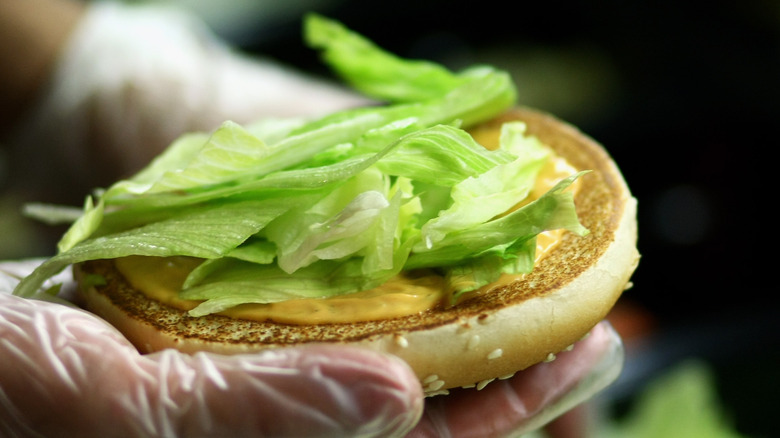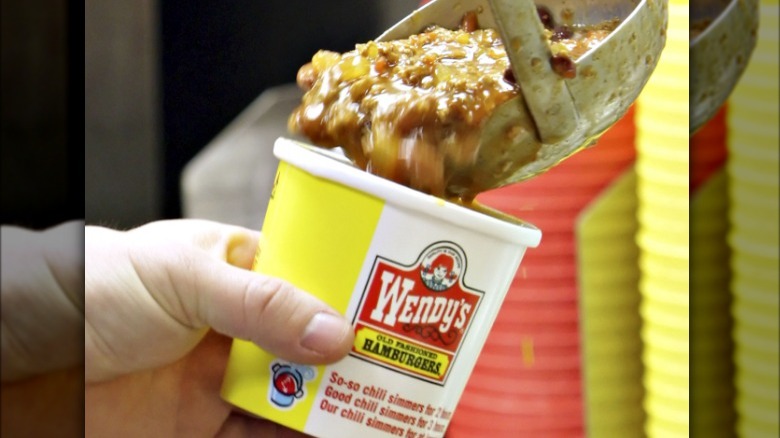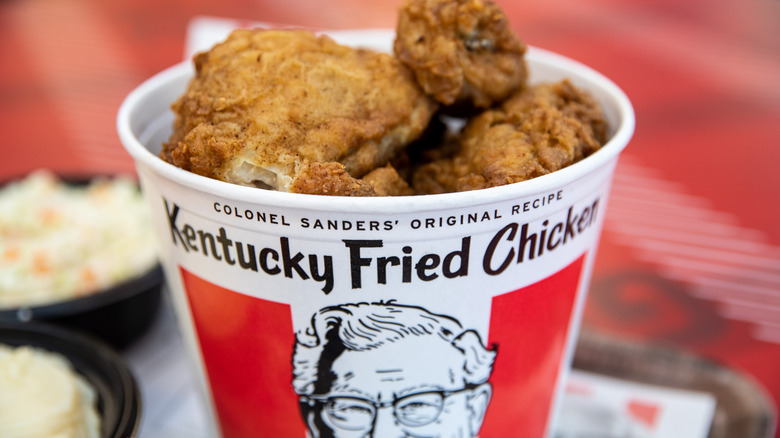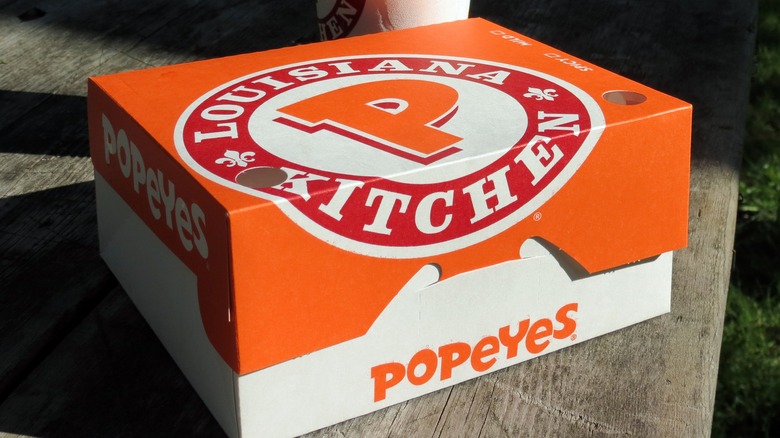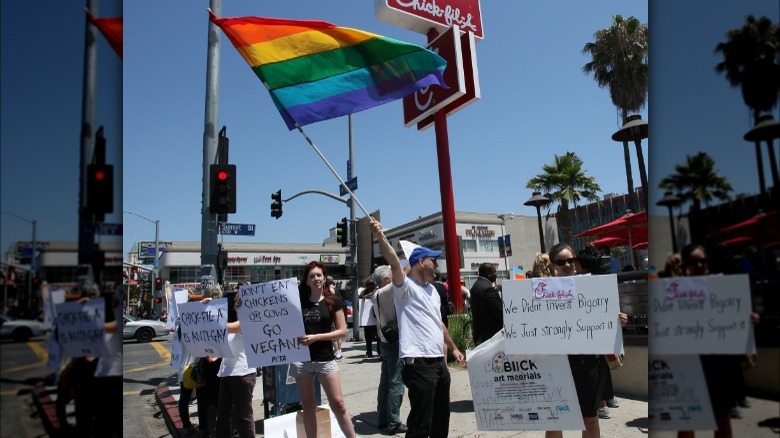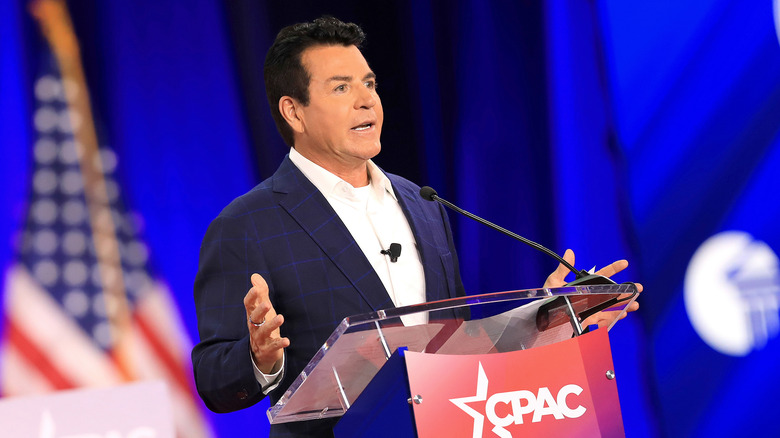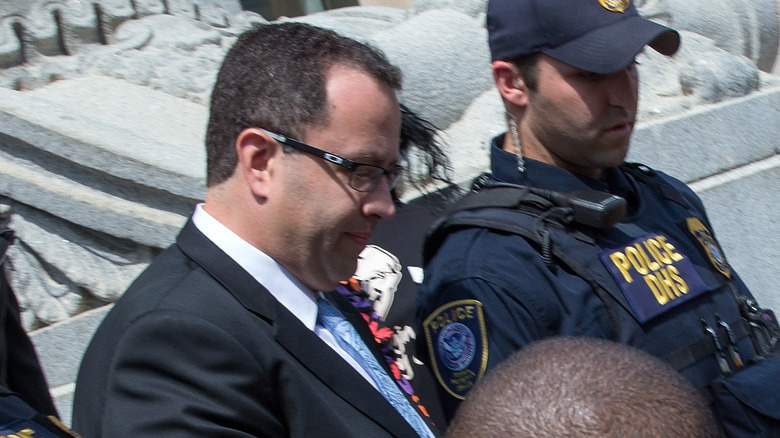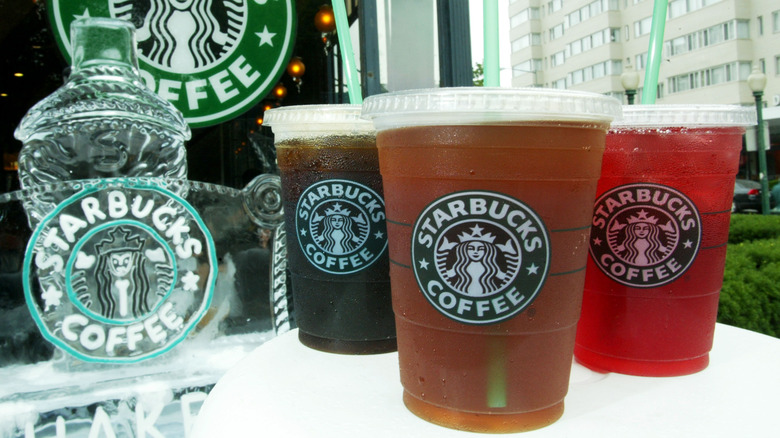Disturbing Fast Food Controversies We Can Never Forget
Did you ever wonder why certain events in life are so monumentally detrimental that they leave an indelible impression on your mind? It's not just you. In fact, since people are far more likely to remember negative events than positive or neutral ones (via Association for Psychological Science), it's really just the way the human brain is wired. Not only that, but according to Boston College psychology professor Elizabeth Kensinger, "the details you remember about a negative event are more likely to be accurate" than others, as she told LiveScience in 2007.
Frankly, then, the brain's general functionality helps explain why we can never forget the nitty-gritty details surrounding a number of disturbing fast food controversies throughout history. This holds true whether it's something relatively benign and amusing (like rumors that KFC changed its name because it no longer sold real chicken), or tremendously troubling — like the formerly-fat Subway spokesman Jared Fogle being convicted for possessing child pornography in 2015 (among other charges), according to IndyStar.
Of course, since we're tasked with writing about all things food-related (the good, the bad, and the devastatingly ugly), we think it's worth revisiting some of the more stunning controversies to emerge from the fast food industry. On that note, we've gathered some of the more prominent examples, and present those disturbing fast food controversies we can never forget — no matter how much we'd like to.
A scalding cup of McDonald's coffee severely burns woman
To be perfectly honest, when we began our research for this topic, the first incident that jumped to mind was the 1990s too-hot-coffee scandal from McDonald's. In fact, we recall a number of folks who felt, at the time, that a lawsuit regarding hot coffee being too hot was peak frivolity — a viewpoint immortalized in a classic "Seinfeld" episode. But Stella Liebeck's actions in the wake of the incredibly severe injuries she sustained in 1992, which included life-threatening third-degree burns (via Vox), clearly demonstrated she wasn't looking for an easy payday.
Perhaps the most important factor in Liebeck's favor is that she initially only wanted McDonald's to cover her medical expenses. After all, the fast food burger chain wasn't oblivious to the fact its near-boiling coffee was a legitimate danger to customers, having faced hundreds of complaints before Liebeck's accident. But when the company offered a meager $800 — rather than the roughly $20,000 she owed in medical costs — she filed suit in 1994.
Recognizing McDonald's had acted egregiously by heating its coffee to extreme temperatures, the jury sided with Liebeck. Consequently, she was awarded $2.9 million in compensation for her suffering — and as punishment for corporate neglect.
Employee seen stomping in piles of lettuce at Burger King
While we'd love to assume each and every restaurant under a fast food chain's banner is exactly the same in how it operates, that's simply not feasible. After all, when a company is responsible for running thousands of locations throughout the world — like Burger King, which has more than 18,700 locations as of 2023 — there's bound to be a bad apple here and there. Or, more appropriately, a bad head of lettuce, as in the case of the disturbing 2012 controversy from a Burger King in Mayfield Heights, Ohio (via Today).
Frankly, the photos of a Burger King employee standing in two buckets filled with lettuce placed on the restaurant's floor are hard to shake. In fact, more than a decade later, we still get squeamish if we think too deeply about the journey a Whopper's lettuce might've taken to our sandwich.
Thankfully, the location of the boot-clad employee standing in lettuce was quickly identified, according to Cleveland.com. As a result, Burger King was able to take "swift action to investigate this matter and terminated the three employees involved," as Bryson Thornton, director of global communications for Burger King, told Today in 2012.
A woman finds a finger in her chili at Wendy's
Every fast food worker has likely had the urge to flip off a disrespectful customer at some point. In fact, we'd venture a guess that anyone who's worked in food service, at any type of restaurant, has stifled the desire to tell a customer how they really feel. Of course, when we envision a Wendy's employee giving a rude customer the finger, it's still attached to their hand — unlike the finger one woman found in her Wendy's chili in 2005 (via The New York Times).
Now, the Dave Thomas-founded restaurant is fairly forthright about its use of fresh ingredients and never-frozen beef patties. But, well ... a human finger isn't what we have in mind when it comes to fresh meat. Thankfully, there's as much truth to this story as there is edible meat to be found on a human finger — as in, little to none. After all, the digit Anna Ayala found in her chili wasn't a surprise discovery, as she herself had placed it in the food (via NBC Bay Area).
Since the severed finger actually belonged to a co-worker of her husband, the police were able to unravel Ayala's hoax quite quickly. And while Wendy's may have lost more than $20 million in sales as a result, Ayala lost her freedom — at least for the four years she spent in prison.
A fried chicken head supposedly served by McDonald's
When it comes to chicken parts worth prioritizing for culinary purposes, nothing may rank lower than the bird's head. Of course, you don't need to be a fan of G-Unit (and their hit "I Wanna Get to Know You") to recognize you shouldn't consider "chasing a chicken head" (a line they totally meant literally). But what if a chicken head arrives at your doorstep without any welcome or warning, as appeared to be the case in 2000, when a woman claimed to find a breaded chicken head in her McDonald's order (via ABC News)? We shudder at the thought.
Now, to be perfectly fair to McDonald's, there's very little follow-up that proves — or, for that matter, disproves — the validity of this claim. In fact, even though the aggrieved customer provided visual evidence of the poultry noggin in question, it's unclear whether this disturbing controversy actually occurred as reported.
Then again, whether or not a controversy proves true in the long run doesn't diminish the controversial course of events, per se. In other words, we can't say for sure if McDonald's did, in fact, serve a customer a chicken's head at the turn of the century. But either way? We'll never forget the disturbing image or thought.
Man claims a rat was found in a fried chicken order at KFC
Everyone has an irrational fear or two — even the seemingly fearless. Along those lines, there's nothing particularly notable about a Dumbo-sized person feeling frightful of rodents in the 21st century. Of course, you don't need to be an enormous, elephant-sized man who's afraid of mice and rats (like this writer) to find the story of a customer purportedly finding a deep-fried rat in his KFC order in 2015 nauseating (via Business Insider).
Of course, despite the photographic evidence — displaying an alleged rat in the customer's order, long, disgusting tail and all — the authenticity of this claim was always somewhat suspect. For one thing, KFC hand breads each piece of chicken in-house, meaning there's often little homogeneity between its chicken pieces. This, in turn, opens the door for some truly unusual-looking final products — even ones that slightly resemble another animal entirely.
Additionally, in November 2016, KFC announced that a DNA test determined the so-called rodent was, in fact, chicken all along (via Fox News). So while we can never forget this controversy, we're relieved to know we can still visit KFC without worrying we'll receive the wrong protein.
A fried rat head allegedly served to customer at Popeye's
We're not entirely sure which is worse: finding a dead rodent in your fried chicken order ... or only finding a dead rodent's head among an assortment of deep-fried breasts, wings, and thighs. Actually, it doesn't really matter either way. Because while we love that chicken from Popeye's (hey, that's the jingle!), if we found a rat's head among our order, as a woman claimed occurred in 2016 (via New York Daily News)? We might never eat fried chicken again.
Now, we're not sure if the Harlem, New York Popeye's location did indeed serve the head of a rat to a customer. But considering several health inspections of the restaurant in question between 2013 and 2017 noted "evidence of mice or live mice present in the facility's food and/or non-food areas" (via New York Daily News), it's difficult to dismiss the claim out of hand.
Furthermore, since that specific Popeye's location was determined to be far from "vermin proof" in May 2015 (via Fox News), there just may be some validity to this story. A Snopes investigation wasn't able to determine the truth one way or another, but we'd err on the side of caution — and advise any readers to skip a Harlem-based Popeye's in the future.
Chick-Fil-A supported and donated money to anti-LGBTQ-aligned groups
There's no confusion surrounding the U.S. Constitution's interpretation of religious freedom in this country. After all, the first amendment clearly restricts any "law respecting an establishment of religion, or prohibiting the free exercise thereof" (via National Archives). Of course, when folks use their religion as a tool to suppress swaths of people for, well, reasons, we can't exactly defend that right. Case in point: when former Chick-Fil-A president Dan Cathy was confronted with his (and the fast food chain's) opposition to same-sex marriage in 2012, he declared he was "guilty as charged" (via Atlanta Journal Constitution).
Obviously, it's no secret Chick-Fil-A is run by staunch Christian followers. After all, its restaurants are closed on Sundays to allow employees a chance to "worship if they choose" (via Chick-Fil-A). Similarly, it's widely known that, prior to 2019, Chick-Fil-A had consistently donated money to (supposedly) Christian charities that actively opposed same-sex marriage and the LGBTQI+ community (via CNBC).
But the notion that Jesus Christ hated anyone (let alone members of the supremely marginalized LGBTQI+ community) is virtually impossible to square with the man's actual words and teachings. For that reason — and the fact that LGBTQI+ discrimination remains disconcertingly prevalent in 2023, this Chick-Fil-A controversy remains both deeply disturbing, and unforgettable.
Horse meat patties were potentially sold at Burger King
If you order a hamburger at a restaurant, would you be able to tell if it was comprised of ground horse meat rather than beef from a cow? Maybe you could. After all, it's entirely possible that you, dear reader, possess a far more discriminating palate than we do. But even if you remained blissfully unaware, it's unlikely you'd be a-OK upon discovering your expected beef patty was made with horse meat instead. Unfortunately, that was nearly the case for diners at several UK Burger King locations in 2013 (via Reuters).
Now, while we've been unable to forget this disturbing controversy, we have to admit we weren't aware it was actually somewhat true. But, according to FOX31, Burger King did, in fact, admit it had purchased meat from a supplier, Silvercrest Foods, where traces of horse DNA were found.
To Burger King's credit, it immediately terminated its contract with Silvercrest Foods upon this discovery, and strongly insisted it never actually served contaminated-with-horse-meat burgers at any of its locations. Still, we'll never forget this controversy — and will forever wonder if BK assisted in a sting operation à la Bob Belcher (H. Jon Benjamin) in "Bob's Burgers" during the Season 7 episode "They Serve Horses, Don't They?"
KFC changed its name because it no longer sells real chicken, according to rumors
We all know why KFC doesn't call itself Kentucky Fried Chicken anymore — or, at least, we're all likely aware of the oft-repeated rumor surrounding the fast food chain's name change. But just because an urban legend suggested KFC can't legally use the word "chicken" in its name any longer — because it actually serves mutated chicken products rather than the real thing (via Business Insider) — doesn't mean it's true.
In fact, according to Snopes, this controversy is powered by a patently false claim. After all, while the fast food chain founded by (technically a real) Colonel Sanders did shorten its name to KFC in 1991, it wasn't to skirt regulations regarding the proper labeling of meat products.
Frankly, it's always nice to learn that a drastically disturbing controversy is nothing more than a silly rumor. Of course, at the same time, true or not? We'll never forget the KFC mutant chicken controversy as long as we live.
Papa John's founder casually dropped racial slurs on a conference call
We've never really understood the appeal of Papa John's. For whatever reason, even when compared to other nationwide pizza chains like Domino's or Pizza Hut, we've always viewed it as a tier below the best. Frankly, then, while we were disgusted enough by founder John Schnatter's casual usage of the N-word on a conference call in 2018 (via Forbes) to forgo future patronage, well ... we weren't exactly making frequent trips to Papa John's beforehand, anyhow.
Schnatter's use of the racial slur (rather than, say, simply alluding to the horrifically offensive word) would be bad enough on its own. But the fact he used it to complain about Colonel Sanders' supposed usage of the slur — seemingly upset the KFC founder was able say the word without backlash, unlike Schnatter — only compounds our objections. After all, there may be no lower form of human conversation or discussion than what-about-ism.
Perhaps the absurd (and completely avoidable) controversy offered a genuine opportunity for growth within Schnatter, though. He told CBS17 in 2021 he'd made efforts to "get rid of this N-word in (his) vocabulary and dictionary and everything else." Of course, at the same time, how much supposed work does it take to simply stop using a word you know offends — and dehumanizes — millions of your fellow humans?
Jared the spokesman from Subway is a sexual predator
When it comes to disturbing fast food controversies, none may be more discomfiting to discuss than the downfall of Subway spokesman Jared Fogle. Like his fellow Subway dieter Clay Henry (Clay Henry!), Fogle became rich and famous after Subway's sandwiches supposedly helped him lose hundreds of pounds. But a darkness lurked underneath the newly-skinny man's surface, and in 2015, Fogle pleaded guilty to possessing child pornography, as well as having sex with a minor (via IndyStar).
In all honesty, we're still shook by Fogle's guilty plea and subsequent conviction. But we'll spare you from most of the uncomfortable (and, quite frankly, infuriating) details, and solely focus on the outcome of the disgraced Subway spokesman's criminal endeavors. After all, if you're really eager to know specifics, the information is out there.
Fogle was sentenced to 15 years in prison by a federal judge, according to NBC News, which was several years longer than the prosecution recommended. Additionally, he'll be forced to register as a sex offender upon release, with law enforcement monitoring any electric devices he owns in the future, as well. Clearly, the man's life and reputation is ruined beyond repair — though you won't find a sympathetic ear in our neck of the woods.
Traces of fecal matter allegedly found in ice at Starbucks
Telling a person to eat crap, as it were, is a fairly common insult in modern U.S. culture. Of course, we're confident very few (if any) people use this phrase literally; and, quite frankly, we can't recall anyone genuinely implying a person should truly ingest feces when prompted. In other words, if a person does, in fact, consume fecal matter of some sort, it's almost certainly by accident. Not that a lack of malicious intent alleviates the queasiness we felt after a 2017 BBC investigation found traces of faecal bacteria in ice from select Starbucks locations.
Now, if we're picking nits here, the reality behind this controversy is far less disturbing than imagined at first glance. Because according to LiveScience, while the bacteria discovered by BBC sounds suspiciously similar to "fecal," just because faecal bacteria was discovered doesn't mean it came from actual feces.
After all, faecal bacteria may be present in feces, but it's also found in countless other, non-fecal materials, as well. Thankfully, then, you can continue to order your venti iced Americano from Starbucks without fear of eating, well ... you know.
